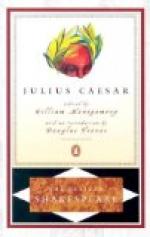|
|
Julius Caesar Author/Context
William Shakespeare was born in Stratford-on-Avon, England, around April 23, 1564. His parents, John Shakespeare and Mary (nee Arden) Shakespeare, had inherited a modest but significant sum of money and land from Mary's father, which apparently increased John's standing in the community. Formerly a tradesmen, he was subsequently elected to town office, most notable as High Bailiff in 1568. Neither John nor Mary was literate, but they somehow secured an education for both of their sons, who were admitted to the Free School around the age of seven. The family had a daughter in 1569, named Jane, followed by another daughter Anne, and a third son, Richard. William left school around the age of thirteen to help his father, whose finances were failing. Gordon stayed in school, and went on to become a successful businessman in London. William was apprenticed to his father, and possibly a butcher, but may also have helped his father, who sold wool and various leather goods. John fell onto very hard times, and the family lost Anne around the same time. Although they stood to inherit money from Mary's stepmother, they got little, and continued to have troubles. Shakespeare was married at the age of 19 - in November of 1582 - to Anne Hathaway, probably before his indenture to the butcher was over. They had their first child, Susanna, on May 26, 1583. Anne was pregnant prior to the marriage - by whom it is not clear - but it seemed to have mattered little to either her or William.
After the documentation of his marriage, literally nothing is known about his life until he is mentioned as an upstart by a theater critic in London in 1592. At that point, it is clear from the documentation that a number of his plays had been produced on London stages to positive acclaim, and that he was a respected and well-known actor as well. By then he had already written a number of works, including Henry VI and the poem Venus and Adonis. It is relatively clear that Shakespeare spent the majority of his time during this period in London, but there is no evidence that Anne and the children (now including Susanna and twins, Hamnet and Judith - named after a couple with whom they were friendly) ever left Stratford.
Shakespeare continued to write and perform, falling into favor with the Lord Chamberlain, to whom he may have dedicated a poem. Shakespeare's acting troupe was sponsored by the Lord, and hence called the Lord Chamberlain's Men. They performed primarily at Court, as well as in other theaters around London. Beginning around 1597, his troupe became the King's Men, and they subsequently were able to perform at Blackfriars, and later at the Globe, in whose profits Shakespeare, along with other actors, had a share. This period of favor in the Court, as well as his business deals and luck, made Shakespeare a relatively wealthy man.
This is approximately the period during which Julius Caesar was written. It begins a series of tragedies produced by Shakespeare over the next couple of years. It is unclear when exactly Julius Caesar was written, but some accounts place its performance around 1599, about eight months after the completion of the Globe theater in January or February of 1599. In any case, it was a familiarly used reference in poems and other written accounts by 1600-01. Julius Caesar is most clearly an adaptation of the account written by the Greek scholar Plutarch, and translated by Sir Thomas North, principally of the lives of Marcus Brutus, Julius Caesar, and Marcus Antonius. In addition to the very clear language linking these two texts, there is evidence that Shakespeare drew heavily from a contemporary paper called A Mirror For Magistrates, which gave an account of the story of Caesar's death.
Around this period, Shakespeare's father passed away. In addition, his son Hamnet had died a few years earlier at the age of 11. Shakespeare's acting troupe was forced to move (literally) across the river to the Globe Theater because the landlord closed their original theater. The troupe and its producers dismantled the former theater, moved its timbers across the river, and used them to build the Globe, which was then the most elaborate and largest theater ever built in London. It was a time of change.
Very little is known about Shakespeare's life, especially regarding his education, family life, and rise to fame in London. Over the years, a number of questions have surfaced regarding the validity of his authorship, especially in light of his limited education. Is it possible that a man who was brought up by illiterate parents would be able to write in such impeccable and moving verse? It's very hard to tell. The academic community, while largely united behind Shakespearean authorship, does remain divided on this issue. There is some evidence that at least one of the plays thought to be written by Shakespeare was actually penned by someone else, but the evidence is difficult to trace to a reliable source. Whatever the case, the plays and sonnets remain a testament to talent somewhere in late-sixteenth century England.
Bibliography
Shakespeare, William. Julius Caesar. T.S. Dorsch, Ed. The Arden Shakespeare. London: Methuen and Co., Ltd. 1965
Halliwell-Phillipps, James Orchard. "The Life of William Shakespeare", in Shakespeare, William. The Complete Works of William Shakespeare. New York: Walter J. Black, Inc. 1925
Mr. William Shakespeare and the Internet
Alan H. Nelson Homepage




